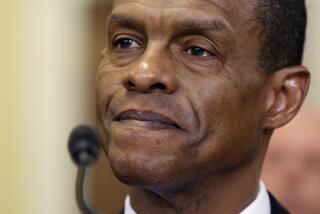Editorial: More reasons for Angelenos to say no to Charter Amendment C
As Los Angeles residents reflected on their riot-ravaged streetscape 25 years ago, a group of civic leaders geared up a ballot campaign to remake the Police Department. For a year, L.A. voters had watched replays of the sickening video images of officers beating unarmed motorist Rodney King. They had read about the group of civic leaders and thinkers who came to be known as the Christopher Commission, and its recommended reforms. They respected the commission, recognized the serious and exhaustive nature of its work, and saw the wisdom of its proposals. When it came time to vote in June 1992, Angelenos gave a resounding “yes” to Charter Amendment F, and in so doing, rebalanced the mix of professional and civilian oversight of the LAPD.
That’s something for Los Angeles to keep in mind today, as voters wonder whether to bother with a seemingly obscure May 16 ballot measure that would sweep away a key part of the commission’s reforms — with no similar civic review, expertise or recommendations.
Yes, voters should bother. They should say “no” to the insidious and deceptive Charter Amendment C, which clothes itself in the righteous language of civilian oversight but would actually undermine effective discipline of wayward police officers.
The subject matter seems trivial but is important: Should police officers accused by their superiors of misconduct continue to take their appeals to a Board of Rights staffed by two command officers and one civilian hearing officer, or should they be able, at their discretion, to choose a panel of only civilians?
This question lies at the heart of a decades-long quest by the police officers’ union to win laxer judgment for challenged misconduct, such as improper shootings or falsified reports.
The Christopher Commission called for, and voters approved, discipline panels with a single civilian and two sworn officers. The police union intently resisted civilian participation at first, but saw that its worries had been misplaced almost immediately after the reconstituted Boards of Rights began its work in 1995. Civilians were far softer on accused officers than were sworn Board of Rights members.
A 1999 LAPD analysis detailed stunning examples of minority reports by civilian hearing officers who were sheepish about tough discipline. In one case in which the chief wanted to fire an officer who drew his weapon during a drunken spat at a fast-food restaurant, the civilian hearing officer voted against firing. When another officer was found guilty of exposing himself and masturbating in public — an offense that easily could have required him to register as a sex offender — the civilian member voted to not to fire him. Fortunately, the police command officers on these Boards of Rights upheld the firings.
Liking the civilians’ go-easy approach, though, the union has long lobbied — unsuccessfully — for boards made up of all civilian members. Two city commissions studying charter reform and a high-octane commission of attorneys and civic leaders that examined the LAPD in the wake of the Rampart corruption scandal rejected the idea in 1999 and 2000. With the LAPD under a federal consent decree in 2005, the court-appointed monitor complained that Boards of Rights already were too lax and that the police chief should mete out punishment against wayward officers without board interference.
There was no expert panel that studied or recommended the measure on the May 16 ballot. Only the police union sought it, and it prevailed on Mayor Eric Garcetti and the City Council to put it on the ballot.
This measure — unlike some of the well-considered changes recommended by independent experts over the years — isn’t reform. It is a sop to the union. Voters should say no to the police union’s bid to sway the discipline process. They should say no to Charter Amendment C.
Some voters in districts around the city also have council or school board measures on their ballots. Our recommendations:
Council District 1: GIL CEDILLO. The Times’ rescinded its endorsement of community activist Joe Bray-Ali after he admitted participating in racist, insensitive and offensive online conversations. That leaves incumbent Gil Cedillo, who has been an unimpressive councilman so far.
Council District 7: MONICA RODRIGUEZ. Rodriguez’s has worked for mayors, council members and the Los Angeles Unified Board of Education; she’s practically done it all in local government. Her experience and her tenacity are needed in a district that has been underserved by past leaders.
Los Angeles Unified Board of Education
District 4: NICK MELVOIN. A former teacher and reform advocate, Melvoin is more willing to confront the district’s serious financial problems and bring new ideas to the board than incumbent Steve Zimmer.
District 6: KELLY GONEZ. Charter school teacher Gonez is well-versed in both classroom realities and big-picture policies. She’d bring a collaborative presence to the board.
Follow the Opinion section on Twitter @latimesopinion and Facebook
More to Read
A cure for the common opinion
Get thought-provoking perspectives with our weekly newsletter.
You may occasionally receive promotional content from the Los Angeles Times.






